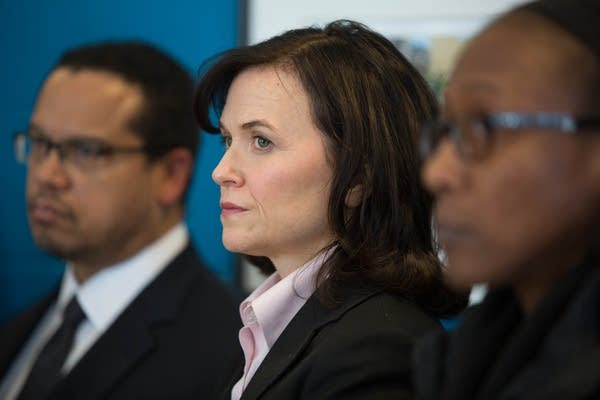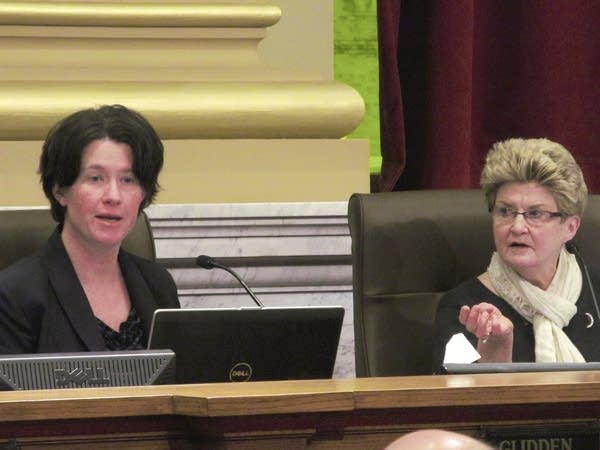New Minneapolis mayor, council vow to tackle racial inequality

Go Deeper.
Create an account or log in to save stories.
Like this?
Thanks for liking this story! We have added it to a list of your favorite stories.
When Mayor Betsy Hodges and the City Council get down to business this year, they promise that racial equality will be on the agenda.
The city's need to narrow wide disparities between white residents and minority communities — in education, employment, health and other areas — was a recurring theme as the city swore in a diverse new City Council on Monday.
Although such gaps exist throughout the country, they are worse in the Twin Cities than just about anywhere else, a problem that Mayor Betsy Hodges mentioned to President Barack Obama when she met with him last month.
"I told him it must be possible for white people and people of color to all thrive in one city and in one region, and that we in Minneapolis, we would be ones to do it," vowed Hodges at today's inauguration ceremony. "And I told the president of the United States, that my goal for Minneapolis is just that — to get that right."
Turn Up Your Support
MPR News helps you turn down the noise and build shared understanding. Turn up your support for this public resource and keep trusted journalism accessible to all.
Hodges didn't outline specific policy proposals for achieving that goal, but promised they would come later. She painted a picture of a future where north, northeast and central Minneapolis experience accelerating growth.
"The population is growing at a faster clip than the rest of the city. And they are adding jobs and businesses faster than the rest of the city," Hodges said. "Arts, commerce and housing make these neighborhoods destinations in their own right, and modern rail — LRT and streetcars — spur this growth as they make their way through the streets and through our neighborhoods."
After the council members took their oaths, activists from Neighborhoods Organizing for Change and Occupy Homes gathered in the City Hall Rotunda chanting "Equity now, equity now."
Although the gathering wasn't a protest, it served as a reminder that community activists will be watching Hodges and the council closely for action.
Organizer Anthony Newby praised Hodges' speech and the diversity of the new council, which includes members of the Somali, Hmong and Latino communities. But Newby vowed to hold the politicians to their promises.
"We know they want to support these issues," he said. "Many of them ran on these issues of equity. We expect from day one that they'll prioritize these issues of equity!"

The demonstration was initially organized in support of Council Member Elizabeth Glidden's bid to become council president. Some newly elected council members thought changing council leadership would give the racial equity issue more momentum. But Glidden failed to muster the votes to unseat Barbara Johnson, who has led the council for the last eight years.
Johnson, who won the presidency in a unanimous vote, said she shares the goal of reducing racial disparities.
"You know I represent part of North Minneapolis where those racial equity gaps are the most stunning," she said. "And I think we really have to look at the concentration of poverty in our city. We have an over concentration in my opinion in North Minneapolis of subsidized housing and I think it's creating problems within our city."
Glidden, who was elected vice president, said she's happy the council is focusing on racial equality.
"I think that we have a community that is anxious for us to make measurable progress, and we have a responsibility to respond to that urgency," Glidden said.
Although the new council's first day was largely harmonious, the council members were divided over whether to give the protesters time to speak at the meeting, a departure from normal council procedures.

Alondra Cano, one of seven new members on the council, wanted to give them the floor for 15 minutes.
"I realize that this may be not a very typical move," Cano said. "And I think that through untypical moves, government can become more responsible and connected to the community members that we seek to represent."
Opponents argued turning the meeting into a public hearing would set a bad precedent, and the measure failed.
Both Johnson and Glidden voted against allowing the protesters to speak. But, in a sign of their shared goals, Hodges joined the activists in song under the City Hall rotunda.



